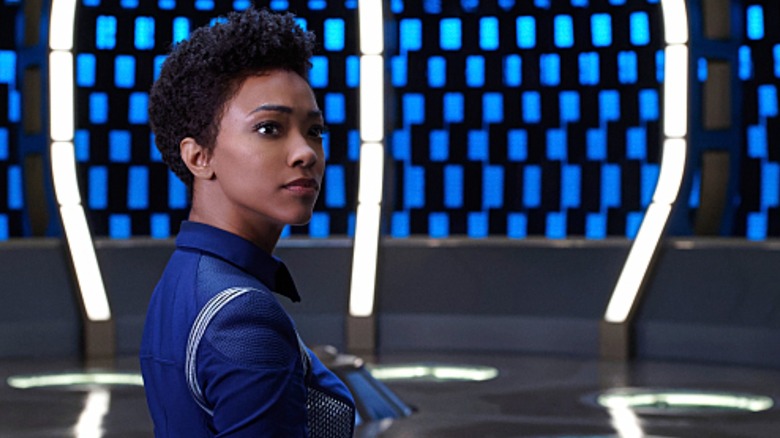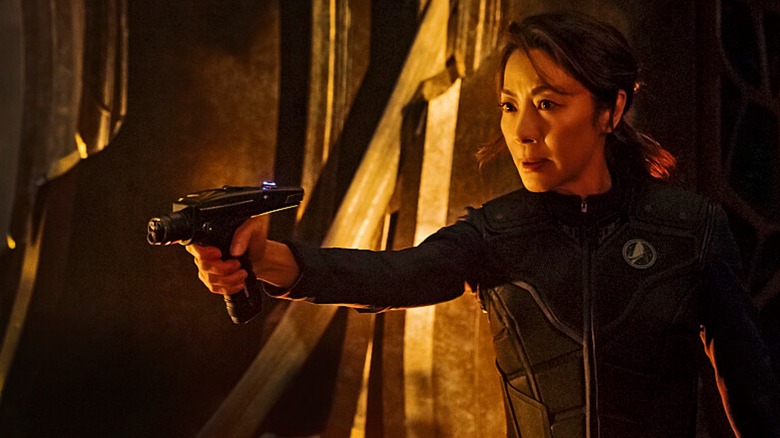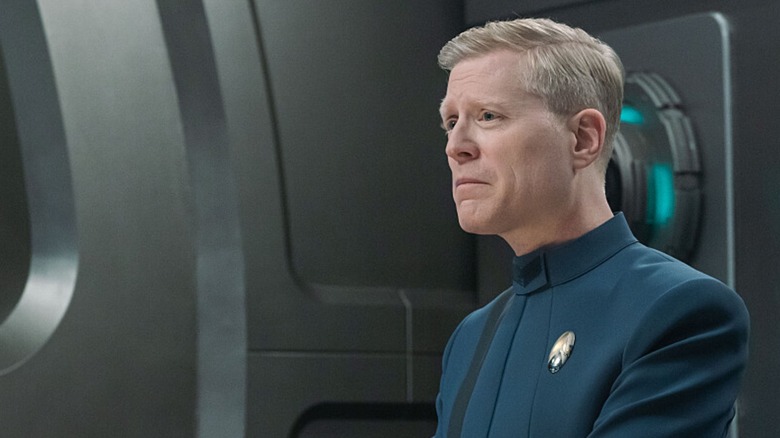Star Trek Exec Thinks He Knows Why Discovery Didn't Connect With Some Fans
"Star Trek: Discovery" came to an end this week after a five season run that included some soaring highs, low lows, and, above all else, big swings. Debuting in 2017, "Discovery" was the first of a new wave of "Trek" shows that would come to define the franchise for modern viewers. It did so ambitiously, but it didn't always work for everyone — especially in the early days. In a new interview with the LA Times, Alex Kurtzman, "Discovery" co-showrunner and head of "Trek" at Paramount+, spoke frankly about the show's initially so-so reception and explained why he thought it might not have worked for "Trek" fans at first.
"I think people felt it was too dark," Kurtzman explained, echoing a sentiment that's popped up in plenty of reactions to the series over the years. While the vast majority of critics have given the show positive reviews over the years (its Rotten Tomatoes critical score stands at 84% positive, though we can't say the same for the audience score), early negative takes focused largely on the show's surprisingly bleak take on the typically hopeful sci-fi franchise. "'Star Trek: Discovery' Slowly Goes Where Dark TV Has Gone Before," read the title of James Poniewozik's New York Times review of season 1. In the article, he made a joke that would be repeated by plenty of others in the show's early seasons: this "Trek" is dark, and not just because of the shadowy, prestige TV cinematography.
Feedback about season 1 influenced Star Trek: Discovery
In his recent profile, Kurtzman says that the "Discovery" writers' room paid attention to feedback during the writing process and internalized it when necessary. "We really listen to our fans in the writers' room — everybody will have read a different article or review over the weekend, and we talk about what feels relevant and what feels less relevant," he told the Times. From that point on, it's a matter of figuring out what's worth paying attention to moving forward. "We engage in a healthy democratic debate about why and begin to apply that; it seeps into the decisions we make," Kurtzman admits.
The show's premiere season starts with Sonequa Martin-Green's Michael Burnham on the brink of starting a Klingon-Federation war, and it ends with her choosing not to commit genocide to end it. What comes in between was equally bleak: Michelle Yeoh's Captain Georgiou, initially positioned as the show's hero, is killed off by the second episode, while one half of the franchise's first openly gay couple, Dr. Culber (William Cruz), got his neck snapped soon after. The show would later bring versions of those characters back, but at the time, it felt to some fans like the optimistic franchise they once loved had gone full "Game of Thrones."
According to Kurtzman, the first season's heaviness was all part of the plan. "Season 1 of 'Discovery' was always intended to be a journey from darkness into light, and ultimately reinforce Roddenberry's vision," he explained. "I think people were just stunned by something that felt darker than any 'Trek' had before." Still, the filmmaker insists that "doing a dark 'Star Trek' really wasn't our goal." Instead, he says, the show did what pretty much every "Trek" show has done since 1966: reflected reality. In this case, unfortunately, reality was bleak as hell. "The show is a mirror that holds itself up to the times, and we were in 2017," Kurtzman explained.
The dark early seasons reflected a depressing point in modern history
"We saw the nation fracture hugely right after the election, and it's only gotten worse since then." Season 1 of the series, he says, was "interpreting that through science fiction." Each time it seemed as though the world of the show couldn't feel any more morally mixed-up, it surprised us with more darkness – something fans enduring the early days of the Trump presidency could no doubt relate to. On top of all that, the show had the difficult mission of setting the groundwork for what "Star Trek" should look like after being absent from television for more than 10 years. No matter what "Discovery" did, for some portion of the fanbase, it just couldn't ever feel enough like the "Trek" they knew and loved. "There were people who appreciated that and others for whom it was just not 'Star Trek,'" Kurtzman said.
The show's growing pains ended up leading to one of modern Trek's biggest accomplishments: the introduction of the familiar Starfleet crew that would end up taking off with "Star Trek: Strange New Worlds." It sounds like that decision was in part made thanks to the frank feedback fans gave on "Discovery" season 1. "And the result, in Season 2, Captain Pike showed up, Number One showed up, Spock showed up, and we began to bring in what felt to people more like the 'Star Trek' they understood," Kurtzman explained. Now, seven years later, the Paramount+ era of "Star Trek" is flourishing, whether it's the unique, special sauce of something like "Star Trek: Lower Decks" or the nostalgia of "Star Trek: Picard," it's safe to say we're getting some of the best "Trek" in decades.
It may have been reborn in the dark, but the "Star Trek" has clearly found the light once more.


